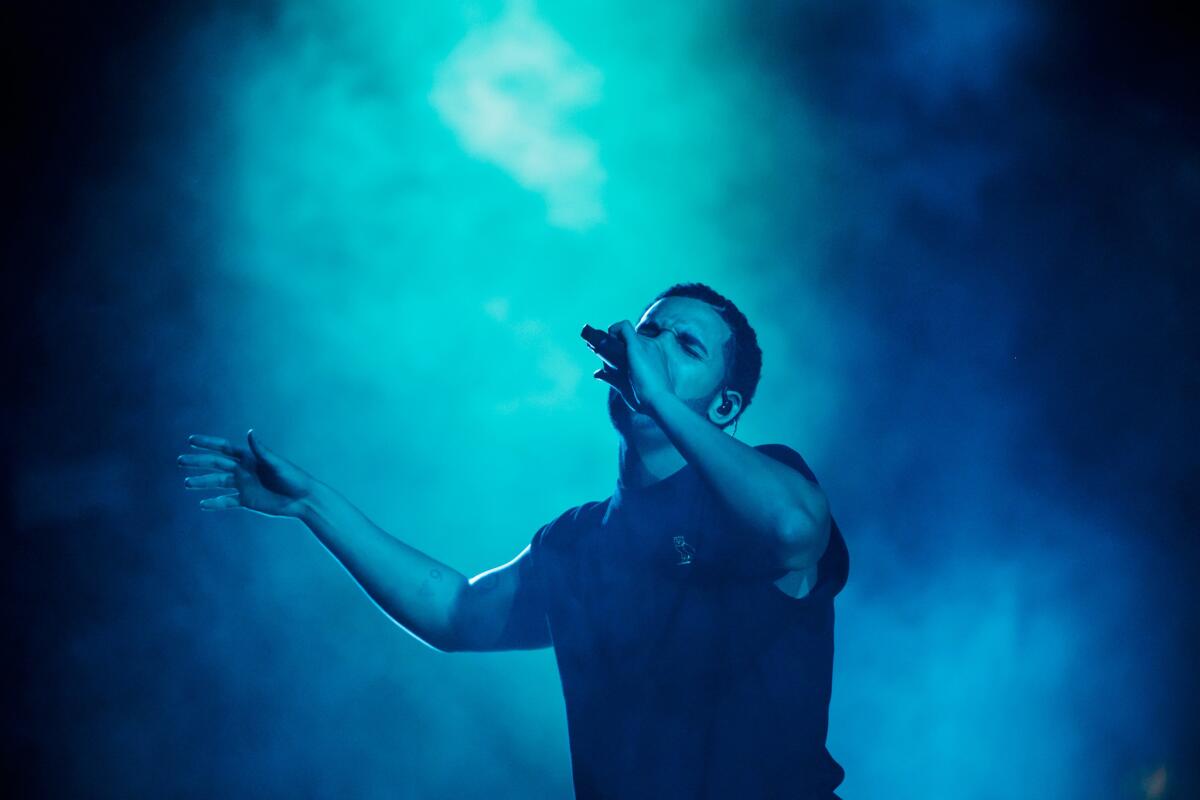Review: Contradictions abound on Drake’s bitter but sensual ‘Views’

- Share via
Superstardom buys many things, and Drake names an awful lot of them on his plush new album, “Views.”
There’s the yacht “so big that they try to hit me with boat fines.” There are the elaborate pool parties that transform his backyard into Mardi Gras. And there’s the car he paid $1.5 million for — then drove only five times.
“Dropped out of school, now we dumb rich,” he boasts in “Pop Style,” in which the 29-year-old rapper goes on to claim that his abundant jewelry has led to the rather regrettable nickname of Chaining Tatum.
This is the well-appointed life of hip-hop’s most impactful artist, a creative trailblazer with huge commercial ambitions who says he sold more than 600,000 copies of “Views” in the 24 hours after it was released late Thursday exclusively on iTunes and Apple Music.
For a pop star, though, Drake’s level of success also buys something else: the privilege of contradiction. What plays like inconsistency in the minor leagues often resembles complexity once you’re at the top. And that’s a generous understanding that Drake takes full advantage of with “Views,” his fourth studio album (not counting various mixtapes), which sets his harshest thoughts about women against the prettiest, most sensual music he’s ever made.
Dubious sexual politics are nothing new for Drake, whose greatest accomplishment might be the way he’s established a reputation as an emotional savant — and in the process expanded hip-hop’s thematic terrain — primarily by whining about his lovers’ duplicity. But he doubles down on the bitterness here, a hardening it’s now clear he was hinting at in “Hotline Bling,” the repugnant (and irresistible) 2015 smash in which he criticizes a former girlfriend for daring to enjoy a glass of champagne on the dance floor.
On “Views,” Drake sometimes seems as though he’s trying to get us to think the worst of him, be it the moment in “Redemption” when he brags that “I gave your nickname to someone else,” or the line in “U With Me?” where he mocks a lover’s vision of domestic intimacy. He can be just plain mean too, as in “Child’s Play”: “You go to CVS for Kotex in my Bugatti / I took the key and tried to hide it so you can’t drive it.”
What’s truly staggering is that he sees himself, men’s-rights-style, as the victim in these dramas. “This year for Christmas I just want apologies,” he says in “Redemption” before naming several women he thinks each owe him one. “Wonder if they wish it could’ve been different / Wonder what they’d do, put in my position.”
Yet for all Drake does to push you away, “Redemption” inexorably draws you in with a shimmering slow-motion groove produced by the rapper’s most trusted collaborator, 40. And that’s just one of the many deeply beautiful tracks here that further dismantles whatever barrier was left between rap and R&B following Drake’s earlier albums. “Feel No Ways” rides a luscious quiet-storm beat; “With You” has a delicately strobing synth pattern; “Controlla” and “One Dance” swirl warm, bubbly dance styles from Africa and the Caribbean. There’s even a gorgeous psychedelic-soul interlude.
In a couple of songs Drake’s producers use sampled female vocals (including those of Mary J. Blige and Brandy) as a bed for his paranoid musings, which feels especially egregious in the immediate wake of Beyoncé’s just-released “Lemonade.” With that album, Beyoncé was clearing a much-needed space in mainstream pop for the expression of female communion. And now here’s Drake literally bending women’s voices to suit his blinkered needs — and doing it with elegance to spare.
Perhaps that’s why Rihanna arrives like such a refreshing breeze in “Too Good,” a gently propulsive pop tune that feels like a sequel to her recent “Work,” which featured Drake. For the first half of the song, we hear Drake dishing his usual dirt: “I’m way too good to you,” he sings, “You take my love for granted / I just don’t understand it.”
But then Rihanna enters the track, as cool and relaxed as she’s ever sounded, and throws the same words back at Drake. And to his credit he cedes the spotlight, resisting the temptation to mansplain something about relationships.
On an album defined by conflicting impulses, hers is the force equal and opposite to his.
Twitter: @mikaelwood
More to Read
The biggest entertainment stories
Get our big stories about Hollywood, film, television, music, arts, culture and more right in your inbox as soon as they publish.
You may occasionally receive promotional content from the Los Angeles Times.











